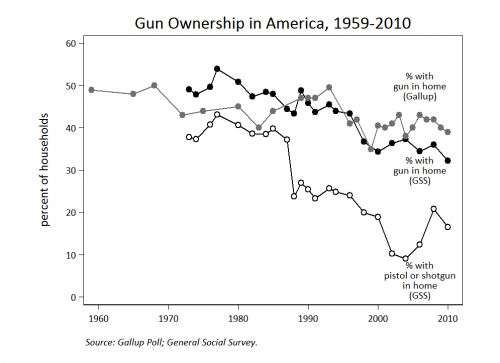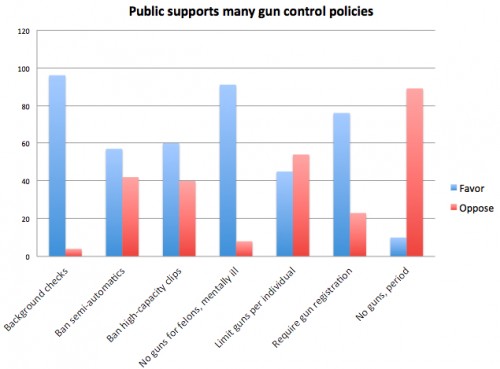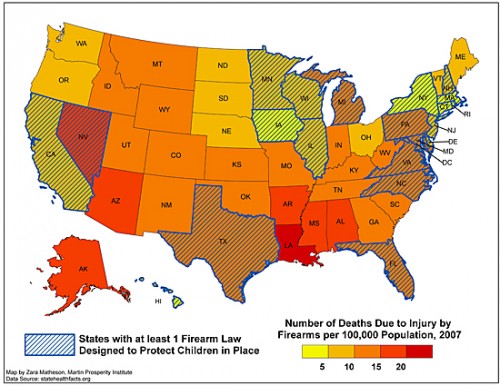Ezra Klein at Wonkblog has put together an impressive collection of statistics on guns and mass shootings, including this data on public opinion on gun control.
To begin, people seem generally less interested in owning guns. The percent of households with guns has been steadily decreasing for decades:
But, perhaps counter-intuitively, support for gun control has waned:
We might expect a tragedy like this week’s shooting to raise the overall level of support for gun control, but it probably won’t. Previous shootings have not had much of an impact on opinion:
Still, there is more support for some forms of gun control than others:
For what it’s worth, gun-related deaths are lower in states with stronger gun control. Economist Richard Florida found “substantial negative correlations between firearm deaths and states that ban assault weapons (-.45), require trigger locks (-.42), and mandate safe storage requirements for guns (-.48)”:
It’s hard to know, however, whether this is correlation or causation. Florida did not find correlations between gun deaths and other factors that we might expect to be correlated, including dense populations, high rates of stress, high numbers of immigrants, and mental illness.
Klein thinks that now is the time to talk about the role of gun control in preventing tragedies like the one in Newtown. He suggests we go ahead and politicize the shooting, since silencing a discussion is just another form of politicization. He writes:
If roads were collapsing all across the United States, killing dozens of drivers, we would surely see that as a moment to talk about what we could do to keep roads from collapsing. If terrorists were detonating bombs in port after port, you can be sure Congress would be working to upgrade the nation’s security measures. If a plague was ripping through communities, public-health officials would be working feverishly to contain it.
Only with gun violence do we respond to repeated tragedies by saying that mourning is acceptable but discussing how to prevent more tragedies is not. “Too soon,” howl supporters of loose gun laws. But as others have observed, talking about how to stop mass shootings in the aftermath of a string of mass shootings isn’t “too soon.” It’s much too late.
I agree that now is a good time to talk about gun control. And, we should do it with as many facts as possible, no matter where they lead us.
Lisa Wade, PhD is an Associate Professor at Tulane University. She is the author of American Hookup, a book about college sexual culture; a textbook about gender; and a forthcoming introductory text: Terrible Magnificent Sociology. You can follow her on Twitter and Instagram.





Comments 13
Yrro Simyarin — December 17, 2012
If it's not "too soon" to talk, fine. End victim disarmament zones. Let teachers carry - we trust them with our students, we can trust them to be armed. The average death toll when a spree murderer is first confronted by cops is several times higher than when they are first confronted by an armed civilian. There is a reason that mass killings almost always happen in "gun free" zones.
There was an armed civilian at the Oregon mall shooting. They didn't end up firing because they knew they would hit civilians if they missed, but after seeing that armed resistance was imminent, the spree killer shot himself rather than risk being injured and detained. There are many other more explicit examples of this phenomenon.Self defense advocates have been pushing these solutions for years, but we generally consider it tacky to jump out immediately after a tragedy like this to link it to our political solutions.
As an aside, it's incredibly sloppy to be happy citing a simple correlation as support for gun control. How many 'studies' have you fisked here because they claimed a simple correlation as evidence? Multiple studies have found little to no impact on overall crime or violence rates from gun control or gun rights legislation. The overwhelming consensus is that within the framework of US law and culture the amount of restrictions on gun ownership is not the controlling variable.
Ted_Howard — December 17, 2012
Did Florida really run a naive regression like that? At a minimum, he should be using panel data with state-fixed effects. Secondly, a less than 0.5 coefficient isn't particularly impressive, especially given the huge potential for omitted variable bias. For example, a populace that supports mandatory safety storage might also be less likely to own and use firearms - viola your specification sucks. Also, his other regressions look suspiciously like data dredging. More generally, it's just a simple fact that most crime regressions on state data tend to be quite fragile. Slight, plausible changes in specification can often lead to huge swings in results. Though it's generally well accepted that whatever variation due to differences in gun control laws is extremely small relative to other state-by-state factors that the effects are borderline negligible. I don't expect us to make any progress on this front until somebody comes up with a plausible, quantitative theory of what causes variations in aggregate crime. Most studies just use a kitchen sink regression and basically do bad data-fitting. Somebody needs to write a mathematical model.
Anyway, I'm not really sure if gun control laws will accomplish what proponents hope. While I don't know of any current studies, as far back as the early 90s Wright & Rossi estimated that only one-fifth of prisoners got their guns from licensed gun dealers. I can't imagine that number has changed much (probably has increased). Given the large stock of outstanding guns, I can't imagine anything but hugely authoritarian gun seizures and control would be that effective. For that matter, most of the city guns bans don't seem to have been particularly effective. Maybe stringent gun control could reduce mass-shooting violence like the type just seen in CT, but I really don't know. I also think it's worth mentioning that Switzerland has low violence and they have a strong "gun culture" and literally give away semiautomatic rifles. So there is a lot more going on in the US then simply access to guns. I think we can go a long way towards explaining why violence in the US is broadly higher, primarily due to our aggressive "war on drugs" and continued disenfranchisement, educationally and socially, of black Americans. But I don't know why mass violence would be more frequent here.
Carrie — December 18, 2012
Mental illness does not cause people to become violent, stop spreading this misinformation.
Dianna Fielding — December 18, 2012
On that bar graph, why are felons and the mentally ill in the same category?